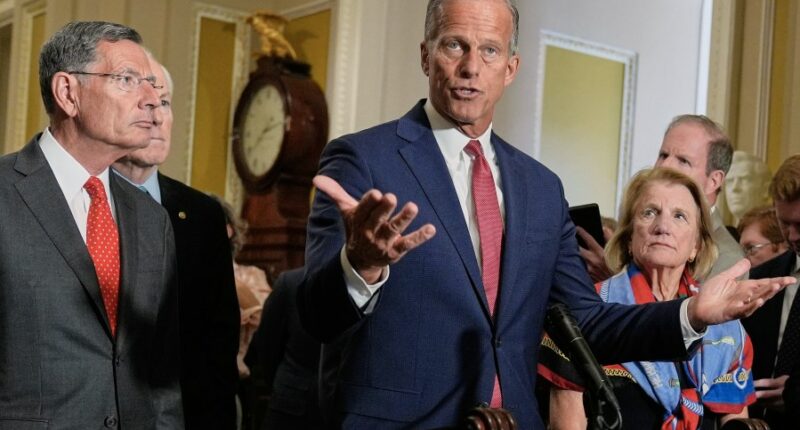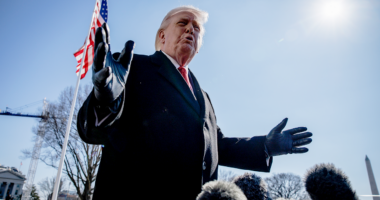Share this @internewscast.com

WASHINGTON (AP) — On Thursday, Senate Republicans initiated efforts to alter the Senate rules to expedite the confirmation of President Donald Trump’s nominees, following the collapse of last-minute discussions with Democrats.
Senate Majority Leader John Thune’s initiative is the latest in over a decade of changes by both Democrats and Republicans aimed at diminishing the power of the filibuster and emphasizing partisanship in the nomination process. Thune criticized the Democrats for what he termed “unbearable” obstruction, as they have prolonged the confirmation timeline, frustrating Trump with numerous unfilled positions within his administration.
Republican senators postponed voting for nearly five hours on Thursday while a bipartisan group attempted to formulate a mutually advantageous agreement. However, these dialogues ceased on Thursday afternoon as negotiations reached a standstill, with Democrats requesting additional time.
“How much time is enough?” questioned Thune, R-S.D., visibly frustrated, as he pushed to continue the voting. Thune mentioned the proposed agreement was based on a Democratic plan from when President Joe Biden was in office, highlighting that both sides had been in discussions for several weeks.
“We’ve got to fix this,” Thune said. “It’s time to vote.”
After abandoning bipartisan negotiations, Republicans reverted to their initial strategy to hold numerous procedural votes that would facilitate the approval of 48 of Trump’s nominees. Part of this voting series involves an attempt to “overturn the chair” or modify the rules, achievable with a simple majority vote.
Next week, Republicans will need to complete additional procedural actions to finalize the process. If successful, the first batch of Trump nominees — including undersecretaries, staff roles in various government agencies, and some ambassador positions — could be confirmed by the following Thursday.
The rules change effort comes as both parties have obstructed the other’s nominees for years, and as both Republicans and Democrats have advocated speeding the process when they are in the majority. The Republican rules change stops short of speeding up votes on high-level Cabinet officials and lifetime judicial appointments.
Republicans have been pushing the rules change since early August, when the Senate left for a monthlong recess after a breakdown in bipartisan negotiations over the confirmation process and Trump told Senate Democratic Leader Chuck Schumer to “GO TO HELL!” on social media.
Democrats have blocked more nominees than ever before as they have struggled to find ways to oppose Trump and the GOP-dominated Congress, and as their voters have pushed them to fight Republicans at every turn. It’s the first time in recent history that the minority party hasn’t allowed at least some quick confirmations.
Schumer has said Democrats are delaying the nominations because Trump’s nominees are “historically bad.”
“If you don’t debate nominees, if you don’t vote on individual nominees, if there’s not some degree of sunlight, what will stop Donald Trump from nominating even worse individuals than we’ve seen to date, knowing this chamber will rubber stamp anything he wishes?” Schumer said Monday.
Still, Democrats continued talks with Republicans into Thursday afternoon as Republicans delayed their votes. The two sides discussed a compromise that would have limited the groups of nominees to 15 and shortened the length of debate.
But in the end, they were not able to agree. Democratic Sen. Brian Schatz of Hawaii said they were “achingly close to a deal.”
“But I am afraid my colleagues on the other side of the aisle have run out of patience,” he added.
“The Senate is stuck,” said Oklahoma Sen. James Lankford, a Republican who led the negotiations. “The challenge is this body has just broken down trust.”
Schumer has told Republicans that they will “come to regret” their action — echoing a similar warning from GOP Leader Mitch McConnell to then-Majority Leader Harry Reid, D-Nev., in 2013, when Democrats changed Senate rules for executive branch and lower court judicial nominees to remove the 60-vote threshold for confirmations. At the time, Republicans were blocking President Barack Obama’s picks.
Republicans took the Senate majority a year later, and McConnell eventually did the same for Supreme Court nominees in 2017 as Democrats tried to block Trump’s nomination of Justice Neil Gorsuch.
“I say to my Republican colleagues, think carefully before taking this step,” Schumer said.

















